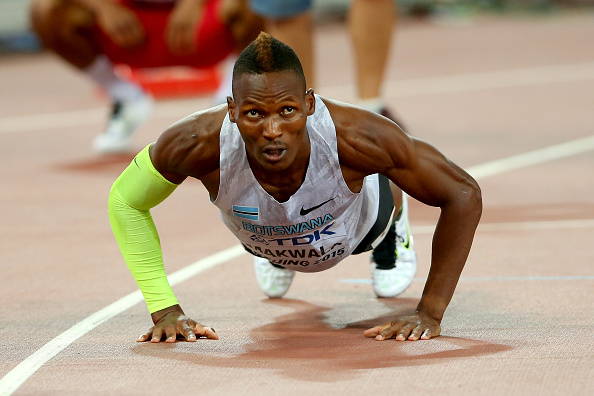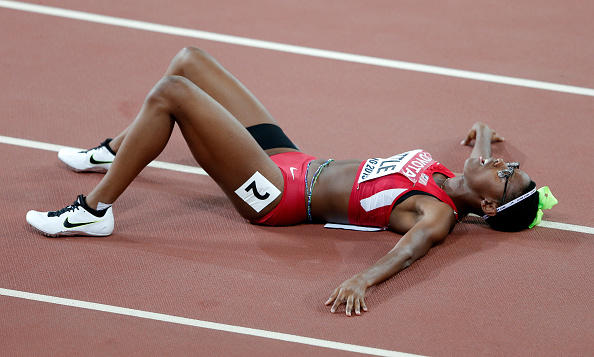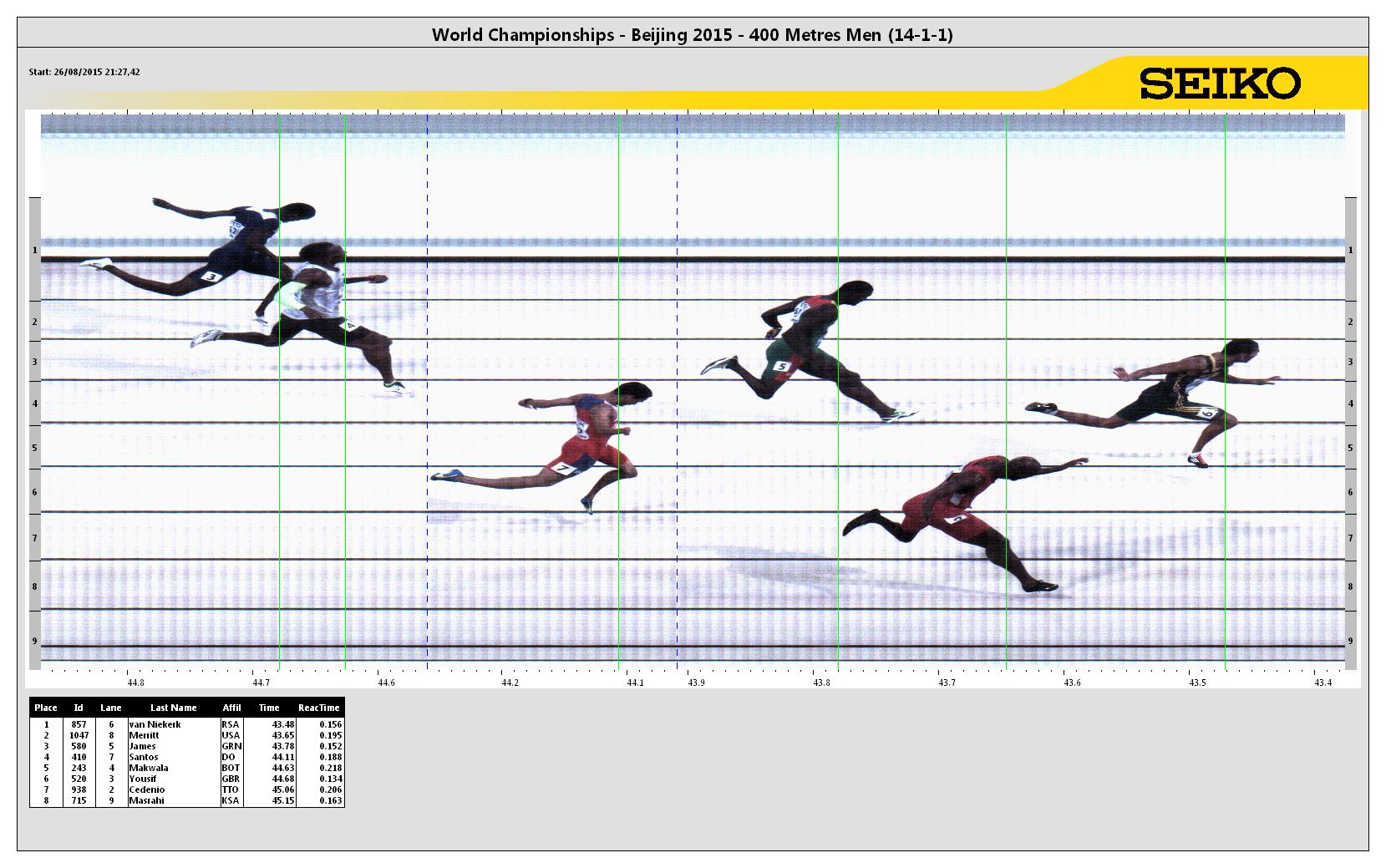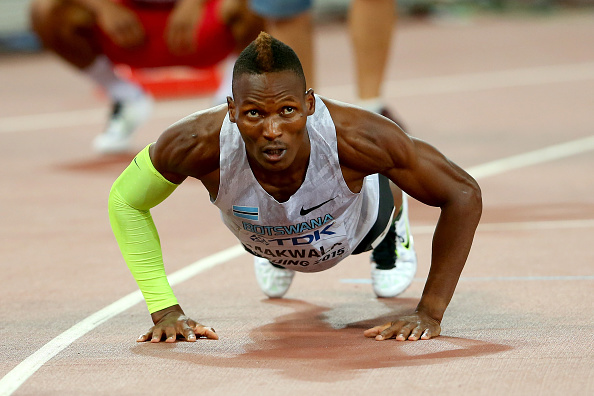BEIJING — Amid keen anticipation that this would finally be the year an American man would medal in the steeplechase at the world championships, Evan Jager headed into the bell lap in the lead.
And then came a fleet of Kenyans. Jager could not keep up. The Kenyans went 1-2-3-4, the master Ezekiel Kemboi winning in 8:11.28.
You’d say it was incredible but, for about 30 years, this is what the Kenyans have been doing in the steeplechase.
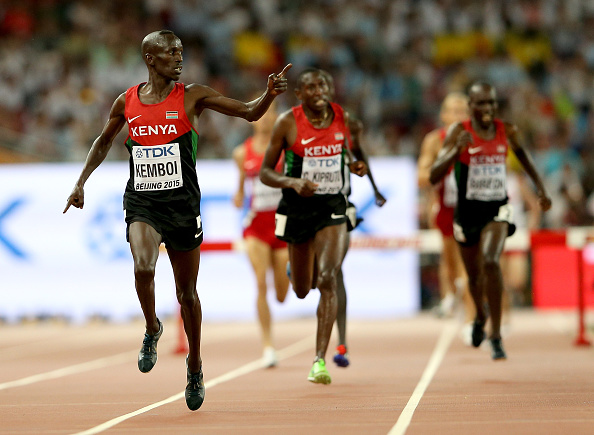
The Americans could take some consolation in a 5-6 finish — Daniel Huling passing a weary Jager down the homestretch for fifth.
Or you might say that the steeplechase is, for some inexplicable reason, the American track and field version of kryptonite, for generations now warding off any and all big-meet success.
Or it’s like the summer sport version of biathlon. Lots and lots of smart people, hard work, real promise — and then, regrettably, nothing.
To quote Bruce Springsteen, how can a poor man stand such times and live?
“Our plan was to go for gold, silver and bronze,” the second-place finisher, Conselsus Kipruto, said afterward. “I am happy that I was able to assist my team. I sacrificed myself for the team. We have a lot of experience but we are still young. Now we want to prepare well for the Olympic Games next year.”
Brimin Kipruto, in third, said, “We could not hope for a better result. I am so proud of my country and my team.”
In other action Monday, the U.S. woman recorded a best-ever finish in the 10k, 3-4-6, Emily Infeld going by Molly Huddle at the line for third; Shalane Flanagan took sixth. Infeld’s third matched the best American worlds finish in the event, Kara Goucher’s Osaka 2007 bronze.
Goucher may be in line for an upgrade to silver for that 2007 race. The second-place finisher, Turkey’s Elvan Abeylegesse, has been linked in recent weeks to doping reports.
Kenya’s Vivian Cheruiyot took gold Monday night, in 31:41.31, Ethiopia’s Gelete Burka silver, 46-hundredths back. Huddle appeared to celebrate too early, raising her arms as she approached the line, Infeld kept going. Infeld: 31:43.49, Huddle nine-hundredths behind.

Colombia’s Caterine Ibarguen affirmed her standing as the world’s best female triple jumper, winning in 14.09 meters, or 46 feet, 2-3/4 inches.
The men’s pole vault saw a shocker: 21-year-old Canada’s Shawn Barber, the 2015 Pan-Am Games champion who attends the University of Akron, winning with a jump of 5.90 meters, or 19 4-1/4. Germany’s Raphael Holzdeppe, the Moscow 2013 champion, took second, at the same height. Renaud Lavillenie of France, who has for the past several years dominated the event, finished in a three-way tie for third, at 5.80, or 19 0-1/4.
And, finally, in the women’s 100, the stellar Jamaican Shelly-Ann Fraser-Pryce, twice an Olympic champion, the reigning world champion at 60 meters, 100, 200 and in the 4x100 relay, did it again. She overpowered a strong field to win in 10.76, green hair flowing behind her, right arm up in triumph as she crossed the line.
The former heptathlon standout Dafne Schippers of Holland took second, in a national-record 10.81. American Tori Bowie got third, in 10.86.
Fraser-Pryce in the 100 at major championships: 2008, 1. 2009, 1. 2011, 4. 2012, 1. 2013, 1. 2015, 1.
"My message always is: no matter where you are from, no matter which past you have, it is all about your future and your goals," Fraser-Pryce said afterward.
A few moments later, she said, "When I ran the heats, I remembered when back in 2008 at the Olympic Games, I was 21 years old -- I expected nothing then. And I came out here tonight -- with a gold medal. Every championship is different. I am really excited."
Two notes of intrigue from the field in that women’s 100: the Jamaican Veronica Campbell-Brown, with seven medals across four Olympics, including three golds, finished fourth, in 10.91. And Nigeria’s Blessing Okagbare, who excels in both the sprints and the long jump, ended up last, in 11.02.
In the American camp, meanwhile, there had been such considerable hope before the men’s steeplechase that Monday, finally, be the night.
Some history:
With the exception of two wins — Paris 2003, Helsinki 2005 — by Saif Saaeed Shaheen representing Qatar, a Kenyan runner has won every worlds steeplechase since Tokyo 1991.
For those not up to speed on the details of the sport, Shaheen was born in — Keiyo District, Kenya. As Stephen Cherono, he ran for Kenya until 2002; he still holds the world record, 7:53.63, set in September 2004 in Brussels.
Every year, worlds or Olympics, the Kenyans seemingly just re-load.
Jairus Birech came into Monday night’s final as the world No. 1, winner of the final six Diamond League steeples in 2014 and three more this year. He has a 7:58.83 to his name.
Consensus Kipruto, the Moscow 2013 silver medalist, had been the only guy to have beaten Birech this summer — in London on July 25. He’s only 20 years old.
Brimin Kipruto is the 2008 Olympic champion (he fell on the sixth lap in London in 2012). Four years ago, at the Monaco Diamond League meet, he missed the world record by one-hundredth of a second. This year, he had run 8:10.09, No. 5 in the world.
And then there is Kemboi.
Kemboi is now 33. He used to be Shaheen’s apprentice.
But for nearly a decade he has been the master of the steeplechase.
Kemboi finished second at the worlds, behind Shaneen, at Helsinki and Paris and then again, behind another Kenyan, Brimin Kipruto, at the Osaka 2007 worlds.
He won at the 2004 Athens Olympics (8:05.81, a Kenyan sweep, Kemboi, Brimin Kipruto, Paul Kipsiele Koech).
Kemboi finished seventh in 2008 here at the Bird’s Nest, his worst international performance.
At major meets since, Kemboi has since been virtually unchallenged — winning the last three world championships, in Berlin 2009 (8:00.43), Daegu 2011 (8:14.85) and Moscow 2013 (8:06.01).
He also won at the London 2012 Summer Games (8:18.56).
Kemboi is not just a winner. He is what you might gently call a character.
After he won in Moscow, for instance, amid a dance-filled victory lap, he showed off his Mohawk haircut and a message on his T-shirt that said his victory was dedicated to the Kenyan president and deputy, “my heroes/my kings/I love Kenya.”

In Daegu, he partially shaved his hair. After he won, he threw his singlet into the stands and took his victory lap with the Kenyan flag tied, sweatshirt-style, around his waist.
In 2002, after winning his first major medal, a silver at the Commonwealth Games, Kemboi was so moved that he named his son (he is now the father of two boys) after the venue: Manchester.
And so on.
As a retort of sorts, Jager has a blonde man-bun.
The Kenyan domination over the years in the steeplechase has been matched, if you will, by American futility.
The American medal record in the steeplechase at the Olympics — in all, five:
Silver, 1920 (Patrick Flynn); bronze, 1932 (Joe McCluskey, and a historical note, in 1932 the race was 3460 meters long, not 3000); gold, 1952 (Horace Ashenfelter, who worked for the FBI and beat the Soviet Vladimir Kazantsev for the win, the only U.S. gold in the event); bronze, 1968 (George Young, behind two Kenyans); and bronze, 1984 (Brian Diemer, the winner, Julius Korir, of course Kenyan).
The American medal record at the world championships: zero.
Again, dating to the first world championships in Helsinki in 1983: zero.
Diemer took fourth at the edition in Rome in 1987.
Overall, before Monday night, Kenya at the worlds: 25 of 42 medals. United States: only seven guys to finish, ever, in the top eight.
As recently as four years ago, the United States did not qualify a single guy for the steeplechase final at Daegu.
Three guys then emerged:
Donn Cabral, the 2011 NCAA champ from Princeton; the next year, he dropped 12 seconds off his personal-best.
Dan Huling, 10 seconds off the final time qualifier in Daegu, endured a dismal two years — he didn’t break 8:20 from 2011 to 2013 — but came back strong this year. His last two races: 8:14 and 8:15.
Two years ago in Moscow, meanwhile, Jager took fifth.
In Paris earlier this summer, Jager set an American record, 8:00.45; he looked set to break eight minutes, saying afterward he thought he was on 7:56 pace, but while ahead fell over the last barrier.
The race is designed to be a physical and mental test. There are 28 hurdles, four each lap, and seven water jumps, one per lap. For those super-interested in the IAAF technical manual, the water depth at the barrier must — repeat, must — be 50 to 70 centimeters, 19.7 to 27.6 inches.
Why is the race called the “steeplechase”? Because, as the story goes, it was first run from the church steeple in one village to the church steeple in the next village.
Saturday’s heats underscored the different ways the race can play out — fast, slow, tactical or not.
— One, Conselsus Kipruto won in 8:41.41. Jager, fifth off the final turn, had to turn on the burners to finish second, one-tenth back. The European champion, France’s Yoann Kowal, took fourth — out of the finals.
If Jager had run just 15-hundredths of a second slower, he would have been out — watching the final on TV or somewhere.
— Two, a much-faster heat. The leaders reached two kilometers in 5:43.18, more than 20 seconds faster than heat one. Birech won, in 8:25.77, followed by Bilal Tabti of Algeria and Cabral.
— Three, Kemboi sat back and waited until the last 200 meters, then kicked to victory in 8:24.75, followed by Brahim Taleb of Morocco and Brimin Kipruto.
The strategy going into the final looked straightforward: four Kenyans against the one American, Jager.
They went through the first 1k in 2:49, Cabral second, Jager fourth, Conselsus Kipruto in front.
At 2k, it was Conselsus Kiputo at 5:36.77, Cabral 12th, Jager cruising along in the pack at 10th.
At the bell lap, it was 7:14.07, and Jager in front.
And then the Kenyans took off, as if lit by rocket fuel, and Jager faded.
Kemboi’s last lap made for what would have been an incredible stand-alone 400 hurdles. He sprinted to the finish in 8:11.28.
Consensus Kipruto took second, a tenth of a second back.
Sixteen-hundredths behind that, Brimin Kipruto.
Fourth: Birech, eight-hundredths out of the medals.
Jager could not keep up the pace. He slipped to sixth, 8:15.47.
Huling passed him down the homestretch. He grabbed fifth, in 8:14.39.
Afterward, Kemboi again wrapped the Kenyan flag around his waist and danced. Ever-so-briefly. And he kept his shirt on.
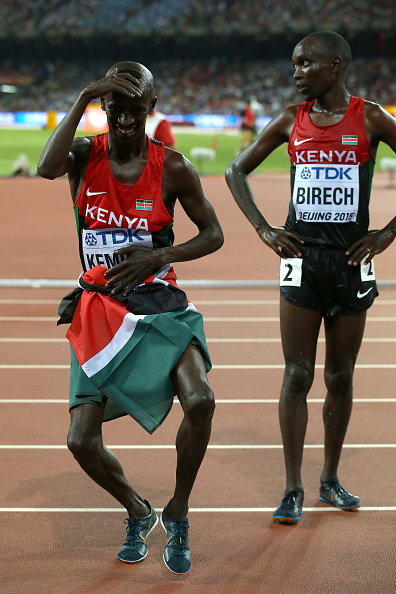
Kemboi now in major meets: 2003, 2. 2004, 1. 2005, 2. 2007, 2. 2008, 7. 2009, 2011, 2012, 2013, 2015: 1.
Huling would say later that his race aim was “sixth or seventh,” a medal “probably outside my talent level, my fitness level, obviously.
“So I wanted to run for sixth to seventh and if I did that and it gave me the opportunity to pick off someone, unfortunately, like Evan. I’m really gutted for him, I really wanted for him to get a medal. He probably spent a lot more energy to try and get a medal today. He probably had a better race than me.”
Jager, referring to the Kenyans, said, “Those guys are so freaking tough over the last lap, running extremely fast over barriers. It’s something that I haven’t figured out yet; I’m working on my entire career how to handle that. It’s definitely different than having a fast last lap in the flat race. It’s just a different element to it. There’s a reason why the Kenyans have won every single steeple world championships they’ve competed in the last 12-13 years. So it’s really tough. I have to figure out something for myself.”
He also said, "I’ll go back to the drawing board.”
Kemboi, meanwhile, got to bask in victory, as ever: “I am so happy about my fourth consecutive world title. It was a strong race. We maintained the pace but I never went in front — only [over] the last 400 meters.”
He also said about that killer kick, “On the last lap nobody could follow me. I will be celebrating tonight with my teammates.”


